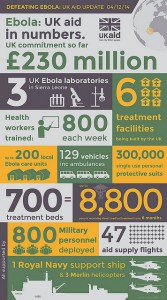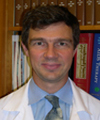2nd February 2015 USA
Tackling Ebola: Q & A with Dr Schieffelin, Tulane University
The UK and US have been leading a coordinated international response to the Ebola in Sierra Leone  and Liberia, the epicentre of the crisis. According to the WHO over 7900 have died out of 20 000 cases of confirmed, probable and suspected cases of the disease.
and Liberia, the epicentre of the crisis. According to the WHO over 7900 have died out of 20 000 cases of confirmed, probable and suspected cases of the disease.
Through collaboration with UK physicians and scientists, Dr Schieffelin one of the world’s leading Ebola researchers based out of Tulane University, has published the largest clinical study to date on Ebola. The work led has earned him and his colleagues the honour of Time’s Person of the Year of 2014. He has also submitted his study details to the UKCDS Ebola Database which aims to be the prime source for worldwide Ebola research details. The UKCDS and UK Science & Innovation Network strongly encourage all Ebola researchers to contribute their information to the Ebola database.
Dev Saha, British Consulate in Houston, interviewed Dr Schieffelin who is currently based in Sierra Leone.
 Has the containment of Ebola Virus Disease (EVD) in Sierra Leone significantly improved since international intervention? What key steps are being taken?
Has the containment of Ebola Virus Disease (EVD) in Sierra Leone significantly improved since international intervention? What key steps are being taken?
The incidence of EVD has greatly decreased in many parts of Sierra Leone as several key things are being set in motion by international partners such as increasing the number of beds in ETUs (Ebola Treatment Units) and establishing triaging centers where suspected patients are admitted and wait for testing results.
Thirty five countries and a number of multilateral organisations around the world have pledged financial, human resource and development support effort to eradicate the disease. Describe the impact of international cooperation on your research and treatment efforts.
Collaboration with other international partners is extremely important. Tulane has been involved in research and capacity building in Sierra Leone for over 10 years (particularly working on Lassa fever, a viral hemorrhagic fever). However, our efforts have been concentrated in Kenema district. Fortunately, the number of cases in this area has greatly decreased. This means that we need to collaborate with partners who have a presence in other districts.
For healthcare providers in other countries, what important lessons can be learned from Kenema Government Hospital?
Routine training and accumulated experience are important for handling patients with extremely contagious diseases. Preparedness has served the Viral Hemorrhagic Fever Ward well in handling endemic disease such as Lassa fever. However, outbreaks such as the current Ebola crisis have rapidly overwhelmed existing systems. It is important to call for help early and loudly. Delays only cost lives of healthcare workers.
Dr. Tom Fletcher from the Liverpool School of Hygeine and Tropical Medicine and the World Health Organization has been very involved with Ebola research? Can you describe one or more collaborative activities in which you both participated?
Dr. Fletcher was one of the first expatriate healthcare workers to arrive in Kenema. His meticulous documentation of patient care was essential to some aspects of our published work. I hope to work more with him on other projects in the coming months.
Tell me more about the lessons learned from this current Ebola crisis. How does it inform future plans, procedures, and preventative activities that researchers and government agencies can use to combat other topics within infectious disease?
This crisis provides many important lessons that can be used to increase preparedness for other outbreaks such as influenza, MERS CoV, SARS, etc. I hope that the greatest lesson to for developed countries is that it is unrealistic for every hospital to be prepared. We need funding to support a core group of trained and experienced healthcare workers who can quickly respond to these outbreaks both internationally and domestically. In addition, we need regional centers that are properly funded to manage these patients long term.
What are key cultural and social insights that both American and British researchers, healthcare providers, and citizens can learn from you and your team as you engage with the populations of West Africa?
Engaging local experts and stakeholders is critically important. Our research was largely possible because we have developed a long term relationship with Sierra Leoneans. We rely heavily on the members of the laboratory, outreach, clinical and ecology team members of the Sierra Leone Lassa Fever Team. They are critical for helping us navigate the cultural, social and governmental systems in the country. They always provide sound advice and guidance and they feel like they have an interest in the work beyond a salary. A “go it alone” approach will lead to endless delays and shoddy research. If you are interested in working in West Africa, find a collaborator who is already involved on the ground and has a track record for engaging the local population. We always include members of our local staff as authors on publications because they are instrumental to the research.
Dr. Schieffelin received his medical degree from Tulane University School of Medicine in 2001. He went on to complete a combined fellowship training program in Adult and Pediatric Infectious Diseases at Louisiana State University Health Sciences Center in New Orleans and Tulane University (2005-2009).
In 2009, Dr. Schieffelin joined the Tulane University School of Medicine faculty in the Departments of Medicine & Pediatrics as an Assistant Professor of Clinical Medicine & Pediatrics. His primary clinical interests include infections in transplant recipients and tuberculosis. His research is focused on pathogen-antibody interactions. Specifically, he is interested in neutralizing and enhancing antibodies that target dengue virus as well as B cell epitopes in Lassa Fever.